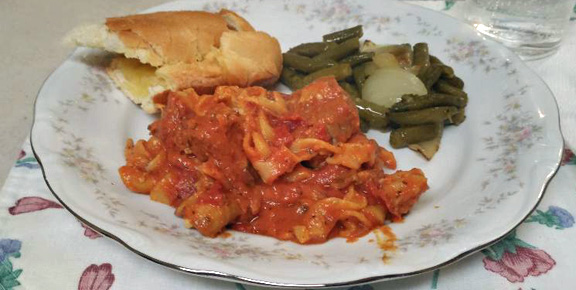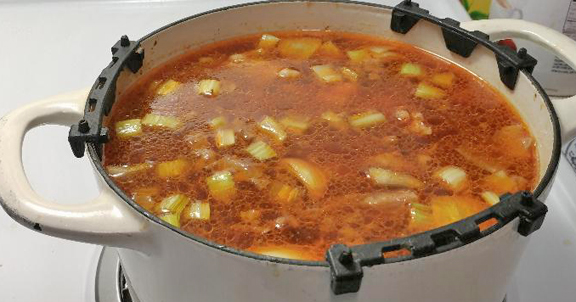In
England they refer to ground beef as “Minced”. Here is yet
another meatloaf recipe for you to try. We dedicate it to the
wonderful wit, Quentin Crisp. While not many would call him an LGBT
hero (he did not believe in gay rights), He was a highly intelligent
performer who lived through decades of homophobia and almost daily
beatings in the streets of London in the 1930's.

In
this take on meatloaf the breadcrumbs are replaced by torn up all
grain wheat bread slices! Try the rich flavoring this gives and read
about an interesting writer and actor to give you excellent dinner
conversation.

Ingredients
½
cup milk
3
bread slices torn up
1
LBS ground beef
½
onion grated
1
tsp salt
pepper
¼
tsp seasoned salt, such as Lawry's
2
eggs, beaten
3
thin bacon slices cut in half and partially cooked
Tomato
Sauce:
½
cup ketchup
6
tablespoons brown sugar
1
teaspoon dry mustard
Dash
or 2 Worcestershire sauce
Directions:

Preheat
the oven to 375
degrees F. Start partially frying the bacon.

You don't want it crisp, it will finish in the oven.

Pour
the milk over the bread and allow it to soak in while oven preheats.
Grate the onion and add it with the juice to the bread pieces. Place
the ground beef, salt, some pepper, and seasoned salt in a large
mixing bowl. Mix in the egg. With clean hands, mix the ingredients
until well combined.

Form
the mixture into a loaf shape on a sprayed 9 x 13 baking dish, which
will allow the fat from the meat to drain.
Next,
make the tomato sauce: Pour the ketchup into a bowl. Add the brown
sugar and dry mustard, and splash in the Worcestershire sauce. Stir
the mixture until well combined. Pour half of the sauce over the
meatloaf. Lay the bacon
slices over the top.

Save
the other half of the sauce to serve along side.

For
our sides I chose to roast cauliflower along with the meatloaf.
Bake
for 45
minutes,
and then pour over another one-third of the remaining tomato sauce
over the meatloaf. Check with a thermometer. You want the meat at 155
to 160
Bake
for an additional 20
to 25 minutes or so, if
still not done, flip the oven to broiler for 7
mins
to give the top a crust.
Allow
to sit
10 minutes before
serving. This is the best time to microwave the mixed veggies for a
second side.
Serve
with a dessert of pear halves with non fat plain yogurt.
What
a wonderful meal for my Master.
For
our music:
https://www.youtube.com/watch?v=EipdAjhImrc
Glad all over
So
happy to serve this for my Master:
socialslave
To
satisfy and restore.
To
nourish, support and maintain.
To
gratify, spoil, comfort and please,
to
nurture, assist, and sustain
…..I
cook!
Please
buy slave's cookbook:
The
Little Black Book of Indiscreet Recipes by Dan White
http://www.amazon.com/dp/B00F315Y4I/ref=cm_sw_r_tw_dp_vAT4sb0934RTMvia @amazon

======================================= Quentin
Crisp

Quentin
Crisp (1908 – 1999) was an English writer, raconteur, actor, and
perhaps best known wit since Oscar Wilde.
From
a conventional suburban background, Crisp wore make-up and painted
his nails. During his teenage years he worked briefly as a rent-boy.
His one-person stage show was a long-running hit both in Britain and
America and he also appeared in films and on TV.
Denis
Charles Pratt was
born in Sutton, Surrey, on Christmas Day 1908. He changed his name to
Quentin Crisp in his twenties after leaving home in 1030.
Around
this time Crisp began visiting the cafés of Soho – his favorite
being The Black Cat
– meeting other young gay men and rent-boys, and experimenting with
make-up and women's clothes. For six months, he worked as a
prostitute.
During
this time, he wore bright make-up, dyed his long hair crimson,
painted his fingernails and wore sandals to display his painted
toe-nails! This brought admiration and curiosity from some quarters,
but generally attracted hostility and violence from strangers passing
him in the streets.
Crisp
attempted to join the British army at the outbreak of the Second
World War, but was rejected and declared exempt by the medical board
on the grounds that he was "suffering
from sexual perversion".
Crisp left his job as an engineer's tracer in 1942 to become a model
in life classes in London.

He
continued posing for artists for three short books by the time he
came to write The Naked Civil Servant at the urging of his agent,
Donald Carroll. The book was published in 1968 to generally good reviews.
In
1975 the television version of The
Naked Civil Servant was
broadcast on British and US television, making actor John Hurt and
Crisp into stars. He devised a one-person show and began touring the
country with it.
When
his autobiography was reprinted in 1975, following the success of the
television version, Gay News commented that the book should have been
published posthumously (Crisp said that this was their polite way of
telling him to drop dead).

By
now Crisp was a theater-filling raconteur: his one-person show sold
out the Duke of York's Theater in London in 1978. He then took the
show to New York. Crisp decided to move to New York permanently. In
1981, he arrived with few possessions and found a small apartment in
Manhattan's East Village.
In the intervening years, he never
attempted any housework, writing famously in his memoir "After
the first four years the dirt doesn't get any worse."
As
he had done in London, Crisp allowed his telephone number to be
listed and saw it as his duty to converse with anyone who called him.
For the first twenty or so years, he habitually answered calls with
the phrase: "Yes, Lord?" ("Just in case," he once
said.)
His
openness to strangers extended to accepting dinner invitations from
almost anyone. Whilst he expected the host would pay for dinner,
Crisp would regal his host with wonderful stories and yarns, much as
he did in his theatrical performances. Dinner with him was said to be
one of the best shows in New York.
He
continued to perform his one-man show, published books on the
importance of contemporary manners and supported himself by accepting
social invitations, and writing film reviews and columns for UK and
US magazines and newspapers. He said that provided one could exist on
peanuts and champagne, one could quite easily live by going to every
cocktail party, premiere and first night to which one was invited.
Crisp
also acted on television and in films. He made his debut as a film
actor in the Royal College of Art's low-budget production of Hamlet
(1976), supported by Helen Mirren. He subsequently appeared in the
1985 film The Bride,
which brought him into contact with Sting, who played the lead role
of Baron Frankenstein. Crisp also appeared on the television show The
Equalizer in the 1987
episode "First Light".
The
1990s would prove to be his most prolific decade as an actor, as more
and more directors offered him roles. In 1992 he was persuaded to
play Elizabeth I in
the film Orlando.
He won acclaim for a dignified and touching performance. Crisp next
had an un-credited cameo in the 1993 AIDS drama Philadelphia.
Crisp accepted some other small bit parts and cameos, such as a
pageant judge in 1995's
To Wong Foo, Thanks for Everything! Julie Newmar.
Crisp's last role was in an independent film, American
Mod (1999), while his
last full-feature film was HomoHeights
(also released as
Happy Heights, 1996).
Crisp
remained fiercely independent and unpredictable into old age. He
caused controversy and confusion in the gay community by jokingly
calling AIDS "a fad", and homosexuality "a terrible
disease". He was continually in demand from journalists
requiring a sound-bite, and throughout the 1990s his commentary was
sought on any number of topics.
At
the age of ninety Crisp came to the realization that he was a trans
woman rather than a gay man. In
The Last Word,
published posthumously, Crisp said, "The only thing in my life I
have wanted and didn't get was to be a woman. It will be my life's
biggest regret. If the operation had been available and cheap when I
was young, say when I was twenty-five or twenty-six, I would have
jumped at the chance. My life would have been much simpler as a
result".
Crisp
died of a heart attack in November 1999, nearly one month before his
91st birthday, in Chorlton-cum-Hardy in Manchester, on the eve of a
nationwide revival of his one-man show. He was cremated with a
minimum of ceremony as he had requested, and his ashes were flown
back to New York.
In
2017, MB Books published The
Last Word: An Autobiography by Crisp,
edited by Ward and Watts. Finally, in 2019, MB Books published And
One More Thing by
Crisp, a companion book to The
Last Word: An
Autobiography, again edited by Ward and Watts.
Sting
dedicated his song "Englishman in New York" (1987) to
Crisp. He had jokingly remarked "that he looked forward to
receiving his naturalization papers so that he could commit a crime
and not be deported." In late 1986 Sting visited Crisp in his
apartment and was told over dinner – what life had been like for a homosexual man in the largely
homophobic Great Britain of the 1920s to the 1960s. Sting was both
shocked and fascinated and decided to write the song. It includes the
lines:
It
takes a man to suffer ignorance and smile,
Be
yourself no matter what they say.
Sting
says, “He was gay at a time in history when it was dangerous to be
so. He had people beating up on him on a daily basis, largely with
the consent of the public."

In
2009 a television sequel to The Naked Civil Servant was broadcast.
Entitled An Englishman
in New York, the
production documented Crisp's later years in Manhattan. Thirty-four
years after his first award-winning performance as Crisp, John Hurt
returned to play him again.




































